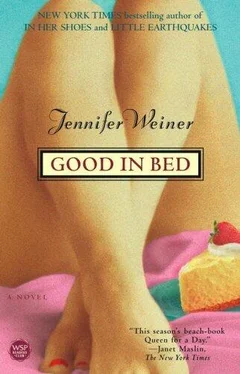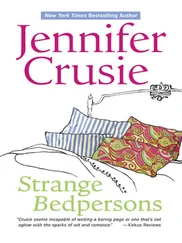“Humiliated in national publication?” he read out loud. “What happened?”
“Ugh,” I said. “You don’t want to know.”
“No, really. I do. I think that’s the most unusual answer anyone’s ever given.”
“Well, my boyfriend…” I winced. “Ex-boyfriend. Excuse me. He’s writing this column for Moxie ”
“Good in Bed?” asked the doctor.
“Why, yes, I like to think so.”
The doctor blushed. “No… I mean…”
“Yeah, that’s the column Bruce writes. Don’t tell me you read it,” I said, thinking, if some fortysomething diet doctor had seen it, I could pretty much assume that everyone else in my life had, too.
“I actually clipped it out,” he told me. “I thought our patients might enjoy it.”
“What? Why?”
“Well, it was actually a fairly sensitive appreciation of… of…”
“A fat lady?” The doctor smiled. “He never called you that.”
“Just everything but.”
“So you’re in here because of the article?”
“Partly.”
The doctor looked at me.
“Okay, mostly. It’s just, I don’t… I never thought of myself… that way. As a larger woman. I mean, I know I am… larger… and I know I should lose weight. I mean, it’s not like I’m blind, or oblivious to the culture, and how Americans expect women to look…”
So you’re here because of America’s expectations?”
“I want to be thin.” He looked at me, waiting. “Well, thinner, anyhow.”
He flipped through my forms. “Your parents are overweight,” he said.
“Well… kind of. My mom’s a little heavy. My father, I haven’t seen in years. He had kind of a belly when he left, but…” I paused. The truth was, I didn’t know where my father was living, and it was always awkward when it came up. “I have no idea what he looks like now.”
The doctor looked up. “You don’t see him?”
“No.”
He scribbled a note. “How about your siblings?”
“Both skinny.” I sighed. “I’m the only one who got hit with the fat stick.”
The doctor laughed. “Hit with the fat stick. I’ve never heard it put quite that way.”
“Yeah, well, I got a million more of ‘em.”
He flipped some more. “You’re a reporter?”
I nodded. He flipped back. “Candace Shapiro… I’ve seen your byline.”
“Really?” This was a surprise. Most civilians skipped right over the bylines.
“You write about television sometimes.” I nodded. “You’re very funny. Do you like your job?”
“I love my job,” I said, and meant it. When I wasn’t obsessing over the high-pressure, in-the-public-eye nature of being a reporter, or scrapping for good assignments with territorial coworkers, and entertaining dreams of the muffin shop, I managed to have a good time. “It’s really fun. Interesting, challenging… all those things.”
He wrote something down in the folder. “And do you feel like your weight affects your job performance… how much money you make, how far you’ve advanced?”
I thought for a minute. “Not really. I mean, sometimes, some of the people I interview… you know, they’re thin, I’m not, I get a little jealous, maybe, or wonder if they think I’m lazy or whatever, and then I have to be careful when I write the articles, not to let the way I’m feeling affect what I say about them. But I’m good at my job. People respect me. Some of them even fear me. And it’s a union paper, so financially I’m okay.”
He laughed, and kept flipping, slowing at the psychology page.
“You were in therapy last year?”
“For about eight weeks,” I said.
“May I ask what for?”
I thought for a minute. There is no easy way to say to someone you’d just met that your mother had announced, at fifty-six, that she was gay. Especially not to someone who sounded like a thin, white James Earl Jones, and would probably be so tickled he’d repeat it out loud. Possibly even more than once.
“Family things,” I finally said.
He just looked at me.
“My mother was… in a new relationship, that was moving very quickly, and it kind of freaked me out.”
“And did the therapy help?”
I thought of the woman my HMO assigned me to, a mousy woman with Little Orphan Annie curls who wore her glasses chained around her neck and seemed a little bit afraid of me. Maybe hearing about the newly lesbian mother and my absent father within the first five minutes of taking my history was more than she’d planned on. She always had this vaguely cringing look, as if she feared that at any moment I would charge across her desk, knock her box of Kleenex to the floor, and try to throttle her.
“I guess so. The therapist’s main point was that I can’t change things other people in my family do, but I can change how I react to them.”
He scratched something in my folder. I tried to do a subtle lean so I could make some of it out, but he had the page tilted at a difficult angle. “Was that good advice?”
I shuddered inwardly, remembering how Tanya moved in six weeks after she and my mother had started dating, and her first act of residence was to move all of the furniture out of what had been my bedroom and replace it with her rainbow-striped sun catchers and self-help books, plus her two-ton loom. By way of saying thanks, she wove Nifkin a small striped sweater. Nifkin wore it once, then ate it.
“I guess so. I mean, the situation’s not perfect, but I’m sort of getting used to it.”
“Well, good,” he said, and flipped my folder closed. “Here’s the thing, Candace.”
“Cannie,” I said. “They only call me Candace when I’m in trouble.”
“Cannie, then,” he said. “We’re running a year-long study of a drug called sibutramin, which works somewhat the way phen-fen did. Did you ever take phen-fen?”
“No,” I said, “but there’s a lady in the lobby who misses it sorely.”
He smiled again. He had, I noticed, a dimple in his left cheek. “I consider myself warned,” he said. “Now, sibutramin’s a lot milder than phen-fen, but it does the same thing, which is basically to fool your brain into thinking that you’re full longer. The good news is, it doesn’t have the same health risks and potential complications that have been associated with phen-fen. We’re looking for women who are at least thirty percent above their ideal weight…”
“… and you’re delighted to inform me that I qualify,” I said sourly.
He smiled. “Now, the studies that have been done already show patients losing between five and ten percent of their body weight in a year’s time.”
I did some quick calculations. Losing ten percent of my body weight was still not going to put me anywhere near the weight I wanted to be.
“Does that disappoint you?”
Was he kidding? It was so frustrating! We had the technology to replace hearts, to put septuagenarians on the moon, to give old geezers erections, and the best modern science could do for me was a lousy ten percent?
“I guess it’s better than nothing,” I said.
“Ten percent is a lot better than nothing,” he said seriously. “Studies show that even losing as little as eight pounds can have a dramatic effect on blood pressure and cholesterol.”
“I’m twenty-eight years old. My blood pressure and cholesterol are fine. I’m not worried about my health.” I heard my voice rising. “I want to be thin. I need to be thin.”
“Candace… Cannie…”
I took a deep breath and rested my forehead in my hands. “I’m sorry.”
He put his hand on my arm. It felt nice. It was probably something they’d taught him to do in medical school: If patient becomes hysterical at prospect of relatively minute weight loss, place one hand gently on forearm I moved my arm away.
Читать дальше












